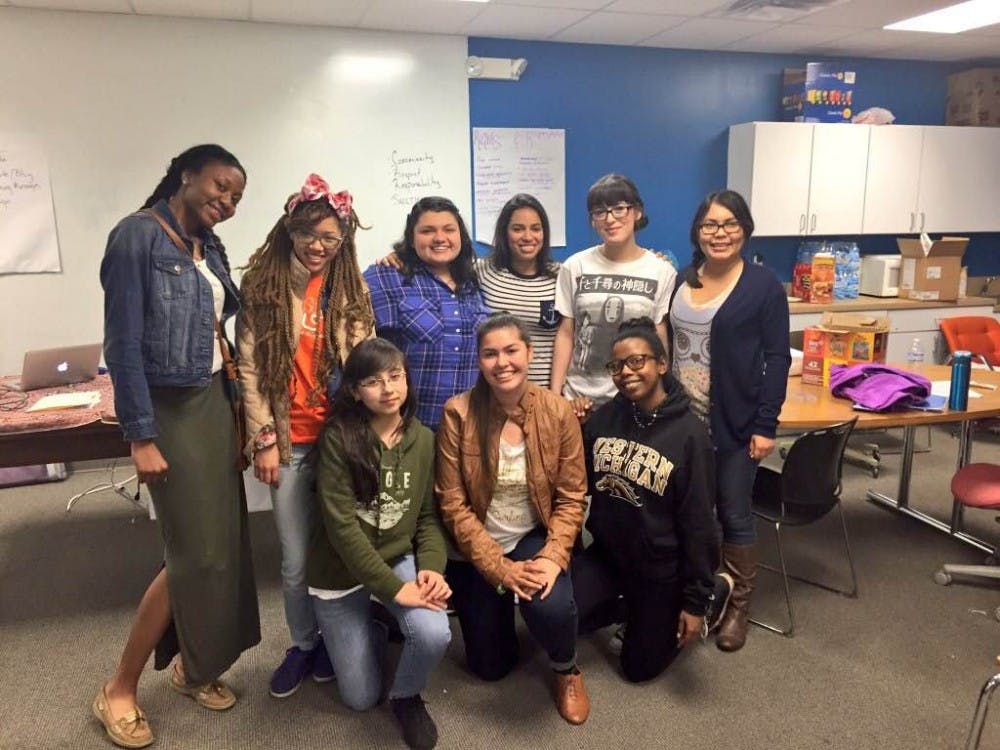Sitting in a circle, one by one, girls shared why the topic of interpersonal violence hit close to home. The solemnity was palpable. You could hear a pin drop. One girl finally mustered up the courage to speak, and no one dared to say a word until she was done.
The girls are part of a fellowship called Girls Making Change. Stephanie Chang, a Michigan State Representative in Detroit, started the fellowship in February of this year, to encourage girls of color to be more involved in politics. Now 10 girls from Cesar Chavez High School, Cristo Rey High School, King High School and Western International are working on a community action plan to try making a difference. The girls started meeting every two weeks, but as the project nears they meet almost every Saturday from 10 a.m. to 3 p.m.
Alessandra Alvarez-Paines, a Caribbean-Salvadoran 18-year-old senior at King High School, said she joined the program because she has “always wanted to be a part of something that was going to help me get closer to my goal of helping others. So I thought GMC was the right fit for me. It was also a program for [girls of color] which really stuck out to me. I felt I could really accomplish something amazing here.”
The action plan is centered on violence and injustice in the community and aims to give a voice to those who are victims of abuse. It targets young adults in the community’s surrounding high schools to further educate them on topics that are often glazed over like the importance of consent and why victim-blaming is wrong.
The girls decided to focus their project on interpersonal violence because they wanted to help spread awareness and partner with other organizations, such as Alternatives For Girls, to make an impact. Two Alternatives For Girls staff members and three peer educators met with the students on May 7 to present the information and resources they have, so that the girls are better equipped for the assembly presentations they plan to have at their corresponding high schools.
The girls decided to reach out to AFG because they noticed the issue wasn’t a novelty in the community and realized, “why try to reinvent a wheel that’s already been created,” said Mary Naoum, one of the group facilitators who is an Assyrian Iraqi-American grad student from the University of Michigan.
The students in the fellowship agreed that the topic of interpersonal violence, which includes physical, mental, emotional and domestic abuse as well as sexual assault, is being overlooked and not enough action is being taken.
One of the group leaders Maria Ibarra, a Hispanic grad student from the University of Michigan, said: “I am excited that the GMC Fellows chose this topic because it's one that deserves more attention. I think often times people are afraid to talk about issues of violence and abuse because it's so painful that we rather pretend it doesn't exist. It inspires me to see that the girls are tackling this issue we a lot of bravery.”
Andrea Soto, a 17-year-old Mexican-Puerto Rican junior at Western International, said she voted for the topic because “it is really important for people to understand what interpersonal violence is so they can identify it when it occurs.”
The girls are moving full force to tackle this issue to really get to their audience so that their voices are heard.
Ibarra is confident that the project will be a success.
“Community change is about building relationships and challenging each other to become better versions of ourselves,” she said. “This project focuses on a concept called 'consciousness raising' in which we highlight a topic of concern to the community so we can see how it affects various facets of our lives. The beautiful part about community action is that it will change the girls who are planning it as much as the rest of the community.”



